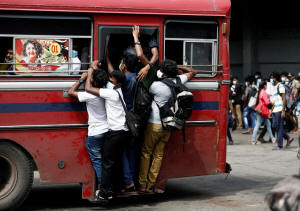Many Sri Lankans flee Colombo as crisis persists
 Send a link to a friend
Send a link to a friend
 [May 12, 2022] By
Alasdair Pal and Uditha Jayasinghe [May 12, 2022] By
Alasdair Pal and Uditha Jayasinghe
COLOMBO (Reuters) -Many Sri Lankans
thronged buses in the main city Colombo on Thursday to return to their
hometowns during a brief relaxation in curfew, imposed after the prime
minister quit and went into hiding and President Gotabaya Rajapaksa
warned of anarchy.
The island nation off India's southern tip, which overlooks shipping
routes between Europe and Asia, is battling its worst economic crisis
since independence. Violence erupted on Monday after supporters of
former Prime Minister Mahinda Rajapaksa, the president's elder brother,
attacked an anti-government protest camp in Colombo.
Days of violent reprisals against government figures aligned to the
powerful Rajapaksa clan followed. The army was called out to patrol the
streets and police said 9 people were killed and more than 300 injured
in the clashes.
Security forces have been ordered to shoot to prevent violence and
looting.
Hundreds of people thronged the main bus station in Colombo after
authorities lifted an indefinite curfew at 7 a.m. (0130 GMT) on
Thursday.
Streets in the commercial capital were calm, though there were queues at
supermarkets as people ventured out to buy essential supplies before the
curfew was reimposed at 2 p.m.
Frustration remained at ongoing fuel shortages that have crippled the
country's economy.

"We have hit the bottom economically," said Nimal Jayantha, an
autorickshaw driver queuing for petrol after the curfew was lifted.
"I don't have the time do my job. By the time I stay in the fuel queue
and get petrol, curfew will be imposed. I will have to go home without
any money."
Protesters have sprayed graffiti over Mahinda Rajapaksa's home in a
southern town and ransacked a museum dedicated to his father. They have
vowed to keep up the protests until the president also quits.
NEW PM THIS WEEK
Mahinda Rajapaksa stepped down after the fighting erupted and is in
hiding in a military base in the northeast of the country. On Thursday,
a magistrate's court issued orders blocking him, his son Namal and other
key allies from leaving the country, lawyers present at the hearing
said.
[to top of second column]
|

An over crowded bus leaves the main bus stand before curfew starts,
after a clash between anti-government demonstrators and Sri Lanka's
ruling party supporters, amid the country's economic crisis, in
Colombo, Sri Lanka, May 12, 2022. REUTERS/Dinuka Liyanawatte

"I personally will extend my fullest cooperation to any
investigation that is taking place with regard to the unfortunate
events that took place on Monday," Namal Rajapaksa said in a tweet
following the order.
"Neither my father nor myself have any intention to leave (Sri
Lanka)."
The president has said he will appoint a new prime minister and
cabinet this week "to prevent the country from falling into anarchy
as well as to maintain the affairs of the government that have been
halted".
The Colombo stock market, closed for the last two days, ended over
three percent up on Thursday on optimism over a new cabinet, traders
said.
Sri Lanka's central bank governor said on Wednesday failing to find
a solution to the crisis in the next one to two weeks would lead to
power cuts of up to 10 to 12 hours per day, as well as his own
resignation. [nB8N2W601J]
President Rajapaksa has repeatedly called for a unity government to
find a way out of the crisis, but opposition leaders say they will
not serve until he resigns.
Hit hard by the pandemic, rising oil prices and tax cuts by the
populist Rajapaksa government, the island nation is experiencing its
worst financial crisis since independence in 1948.
Useable foreign reserves stand as low as $50 million, inflation is
rampant, and shortages of fuel, medicine and other essential goods
have brought thousands onto the streets in more than a month of
anti-government protests, that had remained predominantly peaceful
until Monday.
(Reporting by Alasdair Pal, Uditha Jayasinghe and Channa Kumara in
Colombo; Editing by Raju Gopalakrishnan)
[© 2022 Thomson Reuters. All rights
reserved.]
This material may not be published,
broadcast, rewritten or redistributed.
Thompson Reuters is solely responsible for this content.
 |